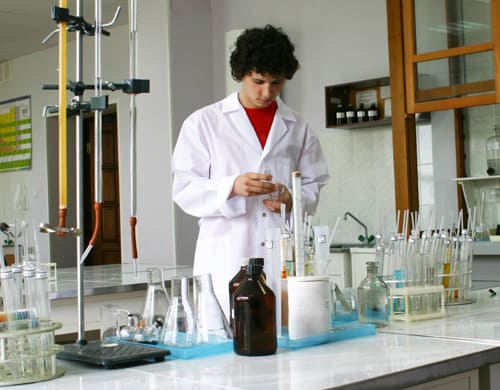
I don’t know about you, but I look back rather nostalgically on the practical exams that I took as an 18 year old as part of my A-levels in physics and chemistry. At the time, I wasn’t looking forward to them at all – they lasted three hours each and there was always the very large possibility of completely mucking up your experiment and/or dropping all your samples on the floor.
Although I’ve forgotten everything about my physics practical exam, the chemistry practical still sticks out in my mind. I remember making some needle-like crystals that, through amazing good fortune, turned out really well – certainly far better than the watery mush I’d created in my mock exams. So when I walked over to the other side of the lab to measure the temperature at which the crystals melted, they did so over a really narrow range – and presumably at the “correct” temperature too.
All in all then I was pretty relieved with that particular exam and was just glad the ordeal was over. I’ve no idea how well I did in my practicals, but I must have done okay as my overall A-level grades were good enough for me to get me into university.
Now, though, news has broken that Ofqual – the independent body that monitors exam standards in England – is to reform science A-levels so that the final grades are based entirely on written tests, with practical exams no longer counting towards a student’s final mark. Science practicals will still take place, but the scores will be recorded separately on exam certificates as either “pass” or “fail”. Practical exams currently make up 20–30% of a student’s final score.
According to The Times, Ofqual has reformed the system because it is concerned that students use Twitter and other social-media sites to discuss assignments set in the practical exams, which – for understandable reasons – they do not all perform at the same time. As a result, those pupils who do their practical exam later can gain an unfair advantage. Other concerns are that schools teach only a narrow range of experimental skills to suit what will come up in the exam and that practicals aren’t really the best way to monitor a student’s experimental ability.
Ofqual’s decision has come in spite of a campaign by learned societies, including the Royal Society, the Wellcome Trust and the Institute of Physics, which publishes Physics World, to keep practicals as part of the main A-level grade. They fear that the change, which will be introduced from next year, will discourage schools from carrying out experiments. They are also concerned that although experimental work is recorded separately, universities will probably just ignore it – or not put much stall on it – when deciding whether to accept a student onto a course.
Worst of all, the reforms seem to say that experiments are not integral to science, but a kind of weird adjunct to it. And I’m not entirely sure how just getting “pass” or “fail” recorded separately on a certificate is going to make anyone particularly want to shine in their practical exams. I can imagine someone who fails will just shrug their shoulders and put it down to being cack-handed on the day. As for someone who is experimentally gifted, just getting a “pass” isn’t exactly a great motivation to push themselves further.
Writing in the Guardian, Jonathan Osborne defends the new system, saying the current approach does not put enough emphasis on experimental design or interpreting the data. But I’m not convinced and I’d be interested to know how practical skills are marked elsewhere in the world. The bottom line is – do you think Ofqual has made the right call?



